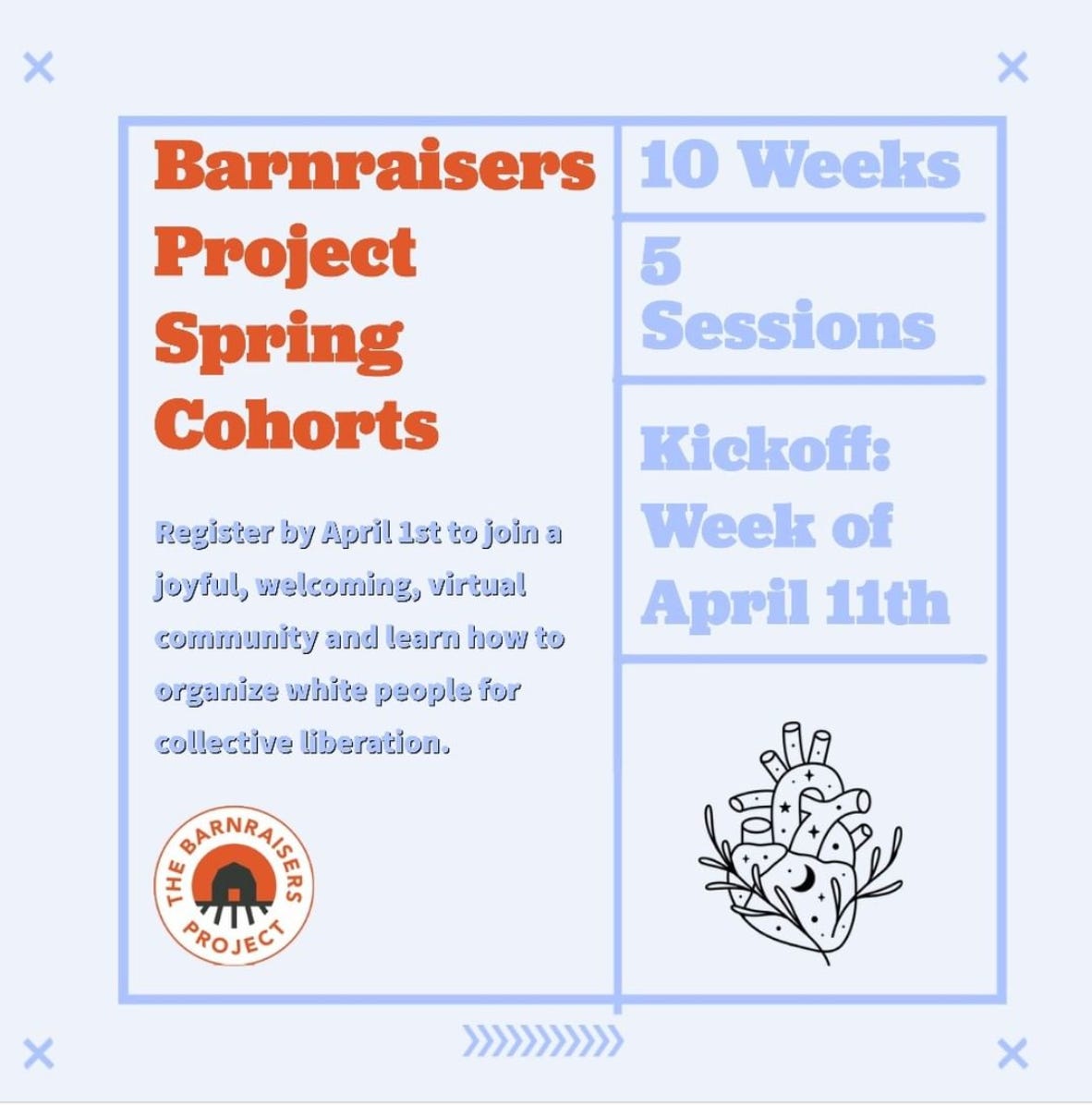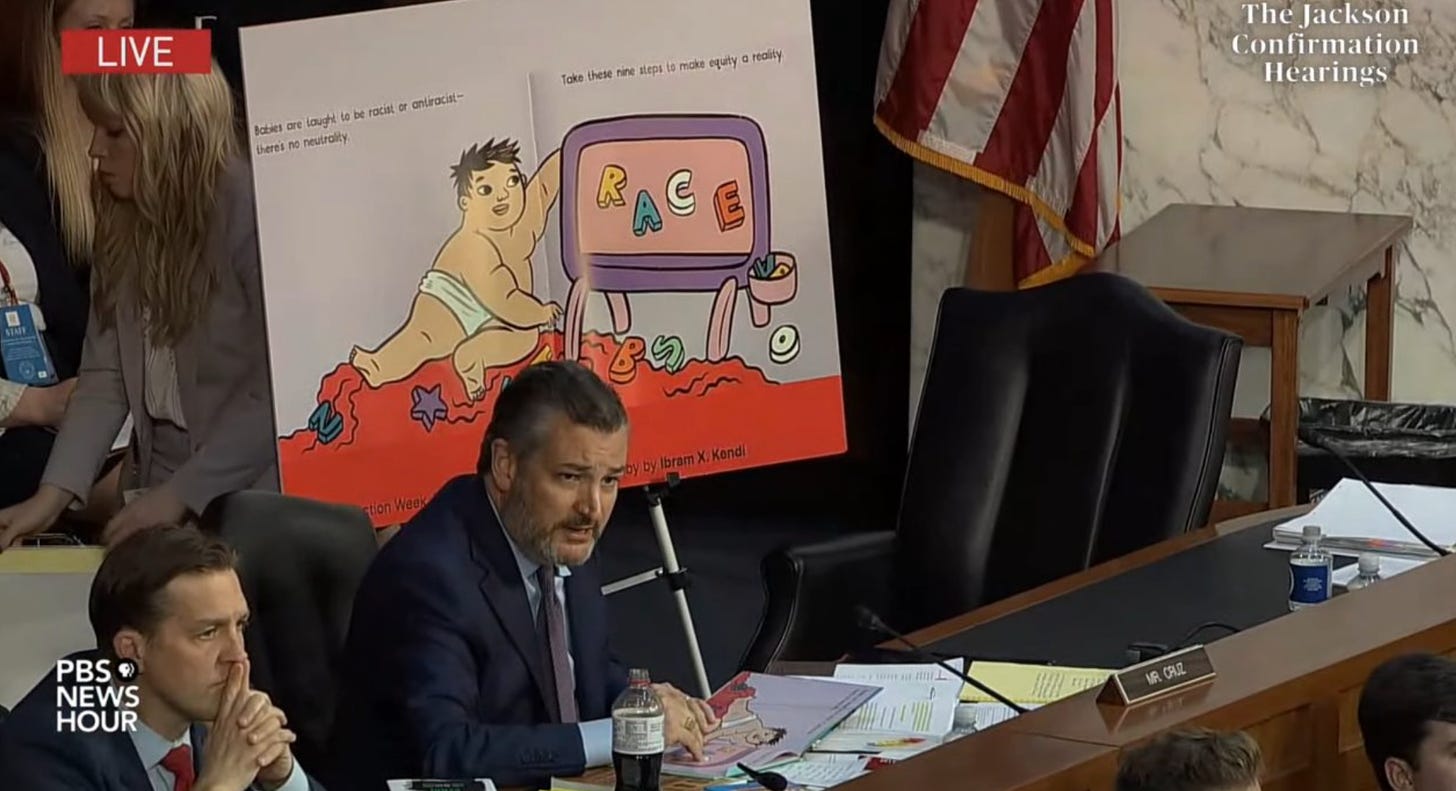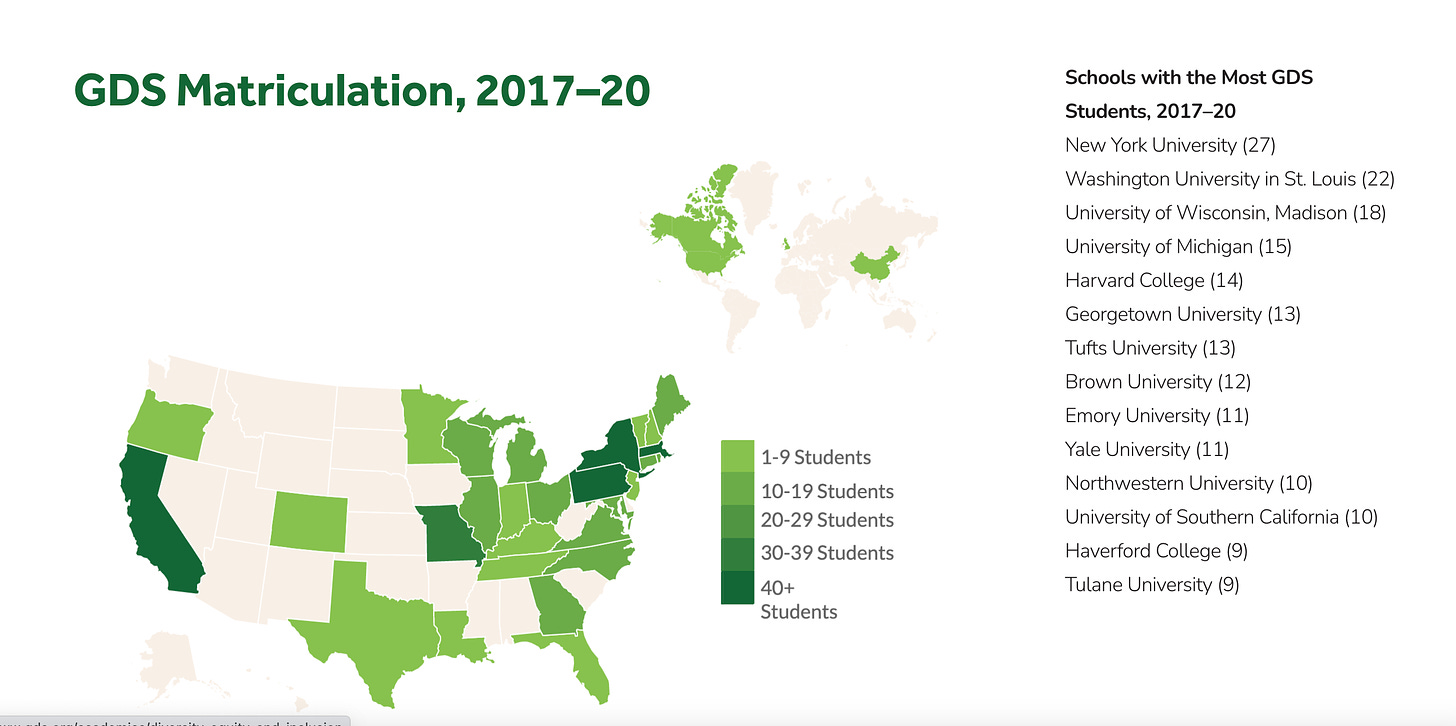Ted Cruz Knew What He Was Doing
The key line in a very bad exchange wasn't "racist babies," it was "Georgetown Day School"
Hi all! I know I said just last week that The White Pages would come out more infrequently while I worked on the book, but I also said, “sometimes I’ll get inspired to comment on something happening in the world” and, well… I guess I didn’t even last a week without something happening in the world. Go figure.
Also: Only ten more days to register for Barnraisers Project Spring Training cohorts! If you get to the end of today’s piece and your reaction is “Ok, Garrett, I get it, but how do I do the kind of non-myopic political work you’re lecturing me about?” I really do think the cohorts might be for you.
There were widely-televised hearings on Capitol Hill this week. While these hearings were ostensibly about Judge Ketanji Brown Jackson’s confirmation to the Supreme Court, that’s never the actual point of these affairs. Congressional hearings are always a big silly Take Your Potential Voters To Work Day, a chance for Senators to puff and strut and test out both various personal branding strategies.
That’s why, if you followed the hearings this week, you heard more about child pornography and the definition of a woman than you did about Judge Brown Jackson’s fitness for the nation’s highest court. That’s also why, more than anything else, you listened as Texas Senator Ted Cruz get very riled up about racist babies.

God Bless Ted Cruz. If he didn’t exist, the Republican Party would be forced to invent him. Because his boundless ambition is so many times larger than his sense of shame, he is the perfect vessel for every new faux-populist attack line. For most of us, the problem with performative political puffery is that if you really want to sell it, you can’t care about your personal dignity. You have to eat a big dumb pork chop at the Iowa State Fair. You have to tell a town hall crowd that you are gravely concerned that their ungrateful grandchildren don’t like their Facebook posts anymore. You have to nod and say yes, that is definitely a case of shadow banning and you will make sure Mark Zuckerberg personally answers for it.
Ted Cruz, bless his extremely craven heart, doesn’t have that problem. He gave up any hope of dignity long, long ago. So, of course, it was America’s most irritating Ivy League striver who was willing to blubber about critical race theory while aides solemnly placed gigantic pictures of fat cartoon babies behind him.
That’s objectively funny! We made jokes! I made jokes! Thank God for Ted Cruz. So consistently mockable. Such an infuriatingly easy target.
The problem, though, is that Ted Cruz isn’t actually stupid. Shameless, yes, but not stupid.
The reason why the Senate Judicial Committee was discussing Antiracist Baby was because of Judge Brown’s position on the Georgetown Day School Board of Trustees. And like Ted Cruz himself, if schools like Georgetown Day School didn’t exist, the conservative movement would have to invent them. It is, as its name suggests, an extremely well-healed educational institution. Tuition is $40,000 a year. Its list of former and current parents read like a who’s who of the post-war, multi-racial D.C. establishment. Liberal heroes like Thurgood Marshall and Ruth Bader Ginsburg sent their kids to Georgetown Day, as did conservatives like Phil Gramm. I don’t know how you’d classify Larry Summers but sure, he sent his kids there, too.
There is a successful Georgetown Day School alum for just about every personality. Are you a movie fan? Olivia Wilde went to GDS! Literary type? So did Jonathan Safran Foer! Also alums: my own personal punk rock hero, Guy Picciotto of Fugazi and (for the conspiracy theorists out there) the guy who owns Comet Ping Pong!
Georgetown Day School is proud of many, many things. It is, of course, quite pleased with its ability to help the children of the Washington elite maintain their elite status. Its college matriculation stats are typical for the kind of august institution that takes pride in funneling its students to other august institutions.
GDS is also quite proud of its commitment to equity and social justice. And, in many ways, it should be! It was the first integrated school in the District of Columbia. That’s a real accomplishment. Today, you could easily spend an entire afternoon navigating the various commitments and action plans and parent and student anti-racism resources on their website. They have hosted workshops by big-time national names in anti-racist pedagogy like Drs. Dena Simmons and Bettina Love. They have so many affinity groups. I have no doubt that, as much as any single institution can Take Anti-Racism Seriously, they have Taken Anti-Racism Seriously. And I truly hope that all of that focus has made a real impact on the experience of Black and Brown students and faculty inside GDS’ hallowed halls.
The text of Ted Cruz’s proxy attack on Dr. Brown via GDS was that it is very bad that she is associated with an institution that teaches about ending policing and how babies are racist. The subtext, though, was that she was associated with this particular type of institution: not just “woke” and multicultural and Kendi-pilled but out-of-touch and cloistered and, most all, ELITE, ELITE, ELITE.
It’s been pointed out that St. John’s School in Houston, the leafy institution (it was the Rushmore school!) where Ted Cruz sends his daughters, also has a website touting its commitment to “community and inclusion.” It even officially recognizes that new conservative boogeyman- “gender identity.” In practice, though, the St. John’s website is muted and vague. It squares the circle it needs to for its particular constituency: a swath of Houston high society that includes both liberals who want a little guilt-laundering from their private schools as well as conservatives who have faux-populist reputations to uphold. St. John’s may offer DEI trainings, but don’t worry— they won’t cancel Latin.
GDS, however, goes all-in on anti-racism, as do so many other private schools across the country with a constituency of wealthy liberals (New York’s Horace Mann, Chicago’s Francis W. Parker, LA’s Crossroads, Oakland’s Park Day… I could go on). And however earnest each institution’s anti-racist work may be, it’s impossible to look at it from the outside without so many obvious questions—about priorities and motives and who does and doesn’t matter— just screaming out at you.
If the wealthiest, most progressive Americans spend this much time cultivating and perfecting their own little jewel box institutions, what does that say for how much they only care about themselves and don’t give a crap about the rest of us?
If these kids and parents and teachers can spend this many hours in these “anti-racism” seminars and then matriculate to Ivy League schools and Wall Street or Big Government jobs and keep the world basically running the same way it’s always run, doesn’t it reveal the emptiness of all this anti-racism talk?
If these $40,000-a-year private schools are truly committed to breaking down unjust structures, why do they continue to exist?
Ted Cruz looked like an idiot this week, but he did his job. He gave a swath of America permission to look at Judge Brown Jackson and see neither an “accomplished, well-qualified jurist” nor “the first Black woman on the Supreme Court” but instead, “Georgetown Day. Georgetown Day. Georgetown Day.” And obviously, his primary reason for making this argument is small and petty— he’s trying to prove to a conservative viewing audience that their new liberal supreme court justice is a superfan of this evil CRT thing they’ve been hearing about. But in doing so, there’s another truth he reveals that should give us social justice types some pause: all of this liberal anti-racist sturm and drang may offer individual representational victories, but little in the name of societal change.
Sometimes even bad faith arguments have a sliver of truth behind them.
The problem, of course, isn’t that professional-managerial class liberals are “too woke'“ or that we’re reading evil books. We should all read Alex Vitale’s End of Policing and Bettina Love’s We Want To Do More Than Survive. Those are great books! I hope that the GDS community learned a lot from them! The real problem is that when we cloister our “justice work” in the institutions where we already spend our time and energy and money— our corporate or nonprofit or academic workplaces, our kids’ elite private schools or segregated public schools, our not-rocking-the-boat churches and synagogues— we ensure that work will be both myopic and won’t meaningfully change society outside of those limited walls.
The most helpful politics-adjacent piece I read this week didn’t have anything to do with the confirmation circus in D.C. It was an intensely well-researched history of voter turnout here in Milwaukee by Marquette Professor Phil Rocco. You should read the whole piece, but the headline is that— both in Milwaukee and in many places— municipal election turn-out used to be sky-high. Citizens were actively involved in the minutia of local government. In Milwaukee, that was in large part because of a deeply pragmatic “sewer socialist” political establishment that wanted citizens to be both involved in public life and to be able to tangibly see the benefit of government as close to home as possible (that’s the “sewer” part of sewer socialism). When that spirit went by the wayside (both because of racism, as Milwaukee grew Blacker after the second Great Migration, and because of systematic attacks on unions) and it became harder for most Milwaukeeans to see themselves as part of a body politic, our city’s appetite for civic engagement died down and what was once a model American city became the most segregated metropolitan area in the nation.
That pattern— that the more we turn away from public-connected politics, the more existing inequities are likely to stagnate— isn’t Milwaukee specific. Robert Putnam has made an entire career documenting the impact of our collective turn away from the commons and towards little fiefdoms. What’s tragic is when even our anti-racism, anti-oppression work just follows that same insular script.
There was a brief period of time when I facilitated workplace equity trainings. I wasn’t very good at them, in large part because I kept telling various anti-racism committees that the best thing they could do for equity wasn’t to hold more meetings but to spend LESS time at work and more time going to a zoning or school board meeting in their hometown, to stop clicking the same boxes on Harvard’s implicit bias assessment and get involved in their neighborhood mutual aid group instead. I still stand by that message, but I also get why I wasn’t hired back.
Georgetown Day School’s anti-racism work doesn’t hold up to scrutiny, not for the ostensible reasons Ted Cruz attacked it this week, but because there are limited hours in the day and limited days to build a better world, and it’s a shame that so many people who truly want to make the world a better place spend so much of their precious time focused on such a small number of institutions. And as long as that’s where a disproportionate amount of this country’s anti-racist attention goes, it won’t be hard to paint justice-minded Americans of all stripes as out-of-touch elitists.
Judge Ketanji Brown Jackson is many, many things. And I’m excited that, very soon, one of those things will be “Supreme Court Justice.” But yesterday, Ted Cruz made her story about a single institution. We all have the choice not to make the same mistake in our own life.
This week’s song, “Dear Justice Letter” by Fugazi.









In a way, this all shows why the work that you are doing is so important.
I'm late to commenting here, but I really appreciate this piece. In this strange moment that I guess is sort of the long tail of racial reckoning started two summers ago, I see a lot of people doing some very weird, energy-intensive things at elite institutions and I can't help but wonder where else that energy could be applied. You articulated it so well here.